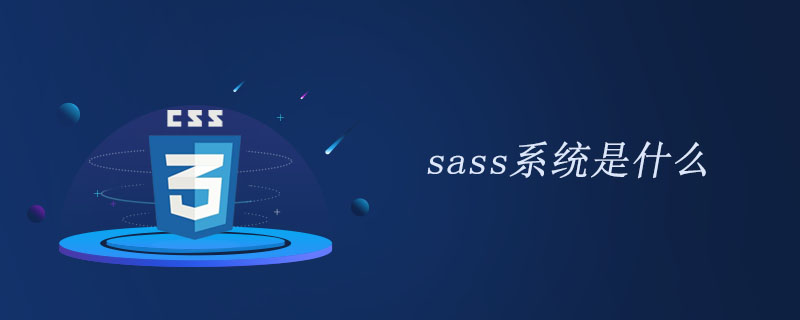
SASS was born in 2007. It is the earliest and most mature CSS preprocessor. It has the support of the ruby community and compass, the most powerful CSS framework. Currently, influenced by LESS, it has evolved to SCSS which is fully compatible with CSS.

Sass (full English name: Syntactically Awesome Stylesheets) is a cascading style sheet language originally designed by Hampton Catlin and developed by Natalie Weizenbaum. After developing the initial version, Weizenbaum and Chris Eppstein continued to expand the functionality of Sass through SassScript. SassScript is a small scripting language used in Sass files. (Recommended learning: CSS3 video tutorial)
Sass is a scripting language that parses scripts into CSS, that is, SassScript. Sass includes two sets of syntax. The original syntax is called "indentation syntax", which is similar to Haml [3]. It uses indentation to distinguish code blocks and carriage returns to separate different rules. The newer syntax is called "SCSS" and uses the same block syntax as CSS, using braces to separate different rules and semicolons to separate specific styles. Typically, these two sets of syntax are distinguished by the file extensions .sass and .scss.
Sass extends CSS3, adding rules, variables, mixins, selectors, inheritance and other features. Sass generates well-formatted CSS code that is easy to organize and maintain.
Sass supports defining variables. Variables start with a dollar sign ($). Variables are assigned using colon (:).
SassScript supports four data types:
Value (can include units)
String
Color
Boolean type
Variables can be used as parameters or return values of functions. During the interpretation process, the interpreter writes the values of the variables into the final CSS file.
SASS is an expansion of the syntax of CSS3 (Cascading Style Sheet). It can use functions such as nesting, mix-in, selector inheritance, etc., and can write Stylesheet more efficiently and flexibly. Sass will eventually compile legal CSS so that it can be used by browsers, which means that its own syntax is not easy for browsers to recognize (although it is very similar to CSS syntax, almost the same) because it is not standard CSS. format, you can use dynamic variables etc. inside its syntax, so it is more like an extremely simple dynamic language.
For more technical articles related to CSS3, please visit the CSS3 Graphic Tutorial column to learn!
The above is the detailed content of what is sass system. For more information, please follow other related articles on the PHP Chinese website!